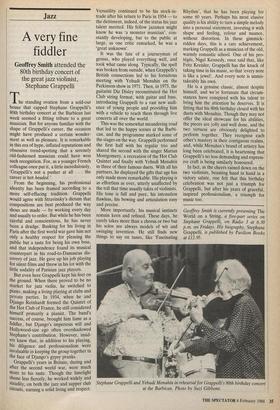Jazz
A very fine fiddler
Geoffrey Smith attended the 80th birthday concert of the great jazz violinist, Stephane Grappelli
The standing ovation from a sold-out house that capped Stephane Grappelli's 80th birthday concert at the Barbican last week seemed a fitting tribute to a great musician. But for anyone familiar with the shape of Grappelli's career, the occasion might have produced a certain wonder- ment as well as pleasure. It is remarkable in this era of hype, inflated reputations and obsessive trend-spotting that a serenely old-fashioned musician could have won such recognition. For, as a younger French colleague once put it, a little incredulously, `Grappelli's not a pusher at all . . . the career is not headed.'
From the beginning, his professional identity has been framed according to a more self-effacing tradition. Grappelli would agree with Stravinsky's dictum that compositions are best produced the way shoes are made — by working every day and usually to order. But while he has been careful and conscientious, he has never been a drudge. Busking for his living in Paris after the first world war gave him not only a healthy respect for pleasing the public but a taste for being his own boss, and that independence found its musical counterpart in his road-to-Damascus dis- covery of jazz. He gave up his job playing for silent films and threw in his lot with the little sodality of Parisian jazz players. But even here Grappelli kept his feet on the ground. When there proved to be no market for jazz violin, he switched to piano, making a living playing at clubs and private parties. In 1934, when he and Django Reinhardt formed the Quintet of the Hot Club of France, he still considered himself primarily a pianist. The band's success, of course, brought him fame as a fiddler, but Django's imperious will and Hollywood-size ego often overshadowed Stephane's contribution. However, insid- ers knew that, in addition to his playing, his diligence and professionalism were invaluable in keeping the group together in the face of Django's gypsy pranks. Grappelli's years in Britain, during and after the second world war, were much more to his taste. Though the limelight shone less fiercely, he worked widely and steadily, on both the jazz and supper club circuits, earning a solid living and respect. Versatility continued to be his stock-in- trade after his return to Paris in 1954 — to the detriment, indeed, of the status his jazz talent merited. His fellow jazzmen might know he was 'a monster musician', con- stantly developing, but to the public at large, as one critic remarked, he was a `great unknown'.
It was the fate of a journeyman of genius, who played everything well, and took what came along. Typically, the spell was broken from outside, when Grappelli's British connections led to his fortuitous meeting with Yehudi 'Menuhin on the Parkinson show in 1971. Then, in 1973, the guitarist Diz Disley reconstituted the Hot Club string format, with guitar and bass, introducing Grappelli to a vast new audi- ence of young people and providing him with a vehicle to reach them through live concerts all over the world.
This was the somewhat meandering road that led to the happy scenes at the Barbi- can, and the programme marked some of the stages on the way. Grappelli performed the first half with his regular trio and shared the second with the singer Marian Montgomery, a recreation of the Hot Club Quintet and finally with Yehudi Menuhin in three of their famous duets. With all his partners, he displayed the gifts that age has only made more remarkable. His playing is as effortless as ever, utterly unaffected by the toll that time usually takes of violinists. His tone is full and pure, his intonation flawless, his bowing and articulation easy and precise.
More importantly, his musical instincts remain keen and refined. These days, he rarely takes more than a chorus or two but his solos are always models of wit and swinging invention. He still finds new things to say on tunes, like 'Fascinating Rhythm', that he has been playing for some 60 years. Perhaps his most elusive quality is his ability to turn a simple melody into a personal statement, investing it with shape and feeling, colour and nuance, without distortion. In these gimmick- ridden days, this is a rare achievement, marking Grappelli as a musician of the old, warmly romantic school. One of his pro- teges, Nigel Kennedy, once said that, like Fritz Kreisler, Grappelli has the knack of taking time in his music, so that 'every note is like a jewel'. And every note is unmis- takeably his own.
He is a genuine classic, almost despite himself, and we're fortunate that circum- stances have conspired with his talent to bring him the attention he deserves. It is fitting that his 80th birthday closed with his duets with Menuhin. Though they may not offer the ideal showcase for his abilities, the pieces are jolly and well done, and the two virtuosi are obviously delighted to perform together. They recognise each other's mastery in their contiguous realms, and, while Menuhin's brand of artistry has long been celebrated, it is heartening that Grappelli's no less demanding and express- ive craft is being similarly honoured.
In fact, as the cheers rained down on the two violinists, beaming hand in hand in a victory salute, one felt that this birthday celebration was not just a triumph for Grappelli, but after his years of graceful, inspired professionalism, a triumph for music too.
Geoffrey Smith is currently presenting The World on a String, a five partseries on Stephane Grappelli, on Radio 3 at 6.30 p.m. on Fridays. His biography, Stephane Grappelli, is published by Pavilion Books at £12.95.
Stephane Grappelli and Yehudi Menuhin in rehearsal for Grappelli's 80th birthday concert at the Barbican. Photo by Suzi Gibbons.


















































 Previous page
Previous page